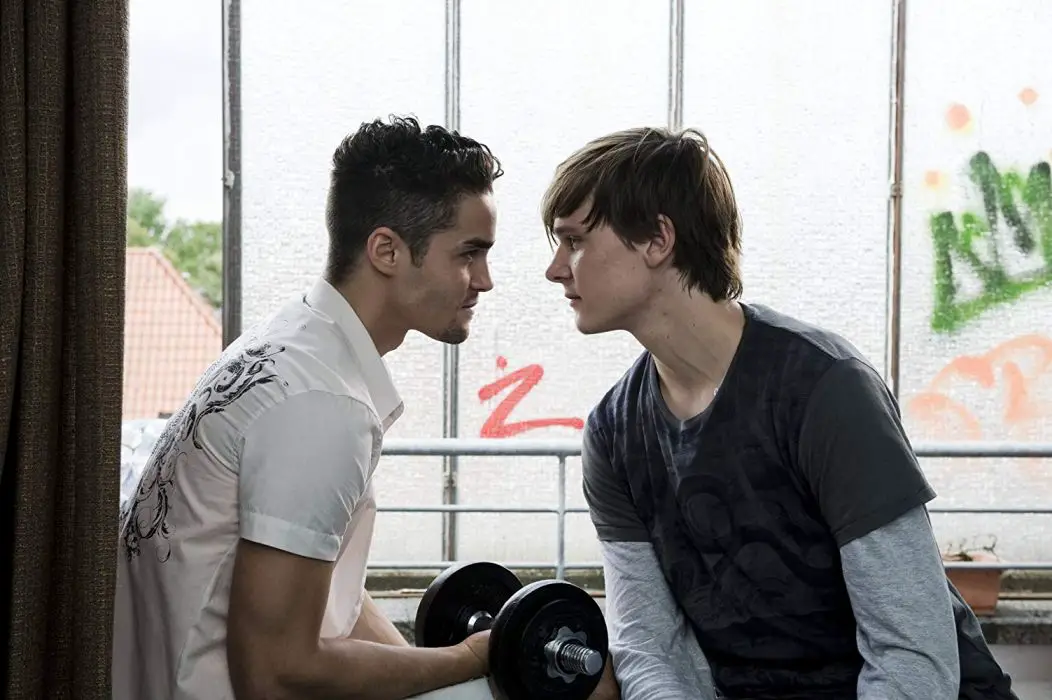Queerly Ever After #21: ROMEOS (2011)

Amanda Jane Stern is an actress, writer, and director from…
Queerly Ever After is a bi-monthly column where I take a look at LGBT+ films that gave their characters a romantic happily-ever-after. There will be spoilers.
Sabine Bernardi’s Romeos centers on Lukas (Rick Okon), a trans-man in his early 20s who has just moved to Cologne on his work-study. Outwardly, Lukas passes as cis-gender (which is what he wants) but he is still in the process of transitioning. His best friend from home, Ine (Liv Lisa Fries), is in the same work-study as him, she is his only confidante. He becomes friends with Sven (Felix Brocke) and strikes up an unlikely romance with the promiscuous bisexual, Fabio (Max Befort).

Before going further, I want to address the fact that Lukas is played by a cis-gendered actor, I gave a pass on casting cis-actors to play trans roles in Girl Stroke Boy (1971) and Different For Girls (1995) (I will cover this film at a later date) because those films were made in a time where finding an openly trans actress would have been difficult if not near-impossible, this film was made in 2011 and I think it would have helped them to actually find a trans-actor to play the role. Especially since this film deals so intimately with the process of Lukas’ transition.

My issue with this movie is that while I believe its heart is in the right place it falls into a few traps of regressive thinking about trans people, treating Lukas’ identity as a trans-man as a big bad secret instead of a facet of his identity. I think its goal in doing this was to show how hard it is to be open about being trans because of others’ preconceived notions and prejudice, and while that is important to display, sometimes the film gets to the point where it feels that the filmmaker might also believe that Lukas isn’t really what he seems, but that he is in disguise, a pretender.
At times, it seems as if the film itself is questioning his gender identity, instead of confronting the prejudices of others. There are several other films on this list where one of the protagonists is trans (this is the only film with a trans-man, the other films portray trans-women) and they do a much better job at toeing the line portraying other people’s close-mindedness and prejudice while never portraying their trans protagonist as the problem.
The Likability Factor
Another problem is that no character is particularly likable, not even Lukas. While a film can be built around unlikable characters, a film depicting the struggles of a trans-man who just wants to be seen as “one of the guys” is not the right movie for that, and I don’t think it was the intention of the filmmaker that the characters be awful. Ine, Lukas’ best friend for example, is supposed to be a sympathetic character, but she’s an awful friend. She taunts Lukas about his identity and how the other guys he hangs out with would feel if they only knew “the truth.” The truth of course, implying that Lukas is not really a man.

At times, this film also comes across as rather exploitative. A large plot point for Lukas is his desire to get top surgery. He spends a lot of time reading up on the entire process. This is not the issue. The issue is the inordinate number of times the viewer is shown Lukas’ breasts. While it is understood that he still has breasts, hence his desire for top surgery, the preponderance with which they are shown feel more like for prurient effect than storytelling necessity.
Did the production want to wow the viewers with the realistic prosthetic breasts they created for Okon? As a character, Lukas feels uncomfortable in his body, specifically because of his breasts, and he wears layers of clothing to hide them, so by showing them so often (in instances where Lukas is not comfortable) it feels like the film is inviting the audience to gawk.
Objectified vs. Empowered
This is not to say that nudity cannot be used for storytelling effect. In contrast with this film, both Different For Girls and Boy Meets Girl (another film I will cover in the future) have a scene towards the end of their respective movies where the trans-woman protagonist strips naked in front of her romantic interest. The difference with the portrayals of nudity in these films is that they signify the characters’ empowering themselves.
These two women have spent their lives trying to define themselves in a cis-normative world, and by willingly standing naked in front of the men they love they are asserting themselves, and their bodies as trans-women. They are not being objectified by the camera, but instead they are telling their love interest, and by default, the audience to accept them as they are and whatever that means for them as trans-women. Lukas on the other hand, is being treated as an object by the camera, uncomfortable in himself as the camera lingers on his chest.
Romeos: In Conclusion
While this film strives to tell an important story, and does get points for being one of the few films out there about a trans-man who gets a happy ending, it is mired in unlikable characters who run the gamut of stereotypes: the bisexual love interest is a horn-dog, the seemingly nice guy friend is actually a creep, so on and so forth. A somewhat valiant effort that falls short of what it could have been.
Romeos was released in Germany on December 8, 2011, it had a DVD release in the US on January 17, 2012. For all other release dates, see here.
Does content like this matter to you?
Become a Member and support film journalism. Unlock access to all of Film Inquiry`s great articles. Join a community of like-minded readers who are passionate about cinema - get access to our private members Network, give back to independent filmmakers, and more.
Amanda Jane Stern is an actress, writer, and director from New York City. She received her BA in Film, Television & Interactive Media and Theater Arts from Brandeis University. She loves regaling whomever will listen with her endless lists of fun facts and knowledge of film history. Follow her on twitter and instagram @amandajanestern













